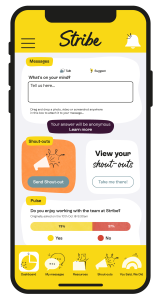Simple Guide To Employee Net Promoter Scores (eNPS)
The healthiest organisations treat eNPS as a starting signal, not an end goal. Used well, eNPS can be a powerful signal of how employees really feel.
Read MoreHow do you engage dispersed teams?
One internet search will bring you masses of articles, reports, statistics, and an overwhelming amount of information.
But there is one simple solution – employee surveys.
That’s right. All it truly takes to engage a dispersed team (or any kind of workforce for that matter) is to simply ask, listen and act.
Allow us to explain…
Surveys serve as a cornerstone for engaging dispersed teams due to their ability to bridge physical distances and create open communication between your employees and leaders.
Unlike traditional methods, surveys (conducted in the right way) offer a direct line of communication to every team member, regardless of their location or time zone.
By asking targeted questions about work dynamics, challenges, and suggestions for improvement, surveys empower employees to voice their opinions and concerns freely – no matter where they are.
Surveys are also one of the most inclusive approaches to gathering feedback – and this not only nurtures engagement, but builds a sense of belonging within teams, and invaluable insights for decision-making.
The first and most evident point is how surveys are brilliant for measuring employee engagement.
Through surveys, you can gauge the happiness and engagement levels of dispersed team members. By asking questions related to job satisfaction, work-life balance, and overall happiness, you will identify any areas of concern and can then take proactive steps to address them – boosting morale and increasing employee engagement.
Surveys allow you to pinpoint specific challenges faced by dispersed teams, whether it be communication barriers, technological constraints, or social isolation.
By collecting feedback on these challenges in real-time via surveys, managers and decision-makers can tailor strategies and implement solutions swiftly, promoting smoother team collaboration and productivity.
Employee surveys promote inclusivity within dispersed teams by ensuring that every team member has an equal opportunity to contribute their thoughts and opinions. This helps build a sense of belonging and team cohesion, despite geographical distances, as employees feel valued and involved in decision-making processes.
By regularly conducting surveys, leaders can gather ongoing feedback from dispersed teams, enabling them to track progress, identify trends, and make data-driven decisions. This continuous process of feedback and improvement ensures that dispersed teams are constantly evolving and adapting to meet changing needs – and keeping employees engaged and motivated.
Employee surveys can play a crucial role in understanding the work-life balance of dispersed team members. By asking questions about workload, flexibility of work hours, and availability of resources for remote work, surveys enable managers to identify potential sources of stress or burnout among team members.
Based on the feedback received, managers can implement policies and practices that support a healthy work-life balance, such as flexible scheduling, wellness programs, or remote work guidelines. This also shows a commitment to employee wellbeing, leading to better engagement and productivity among your dispersed team members.

At Stribe we’re all about bringing teams together, whether they’re in the same building or on different continents. We specialise in employee surveys for dispersed teams.
Our user-friendly interface makes it a breeze to create and distribute pulse surveys, ensuring maximum participation and candid feedback. Plus, our advanced analytics give you the deep dive you need to uncover trends, spot opportunities for improvement, and make data-driven decisions that drive your team forward.
Would you like to see more?
The healthiest organisations treat eNPS as a starting signal, not an end goal. Used well, eNPS can be a powerful signal of how employees really feel.
Read MoreAggregated data tells you what is happening – but not where or why. Segmentation is the solution!
Read MoreIf your organisation has been through failed surveys in the past, you might already be feeling the effects. Learn how to turn it all around.
Read More